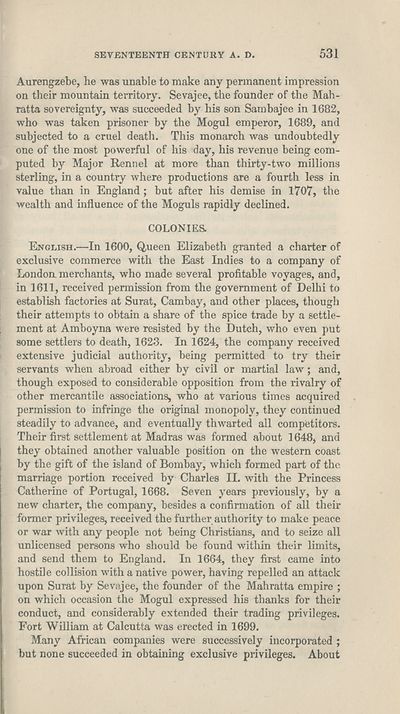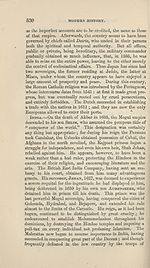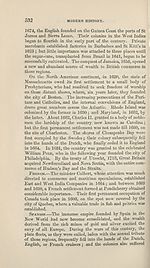Download files
Complete book:
Individual page:
Thumbnail gallery: Grid view | List view

SEVENTEENTH CENTURY A. D.
531
Aurengzebe, he was unable to make any permanent impression
on their mountain territory. Sevajee, the founder of the Mah-
ratta sovereignty, was succeeded by his son Sambajee in 1682,
who was taken prisoner by the Mogul emperor, 1689, and
subjected to a cruel death. This monarch was undoubtedly
one of the most powerful of his day, his revenue being com¬
puted by Major Rennel at more than thirty-two millions
sterling, in a country where productions are a fourth less in
value than in England; but after his demise in 1707, the
wealth and influence of the Moguls rapidly declined.
COLONIES.
English.—In 1600, Queen Elizabeth granted a charter of
exclusive commerce with the East Indies to a company of
London, merchants, who made several profitable voyages, and,
in 1611, received permission from the government of Delhi to
j establish factories at Surat, Cambay, and other places, though
their attempts to obtain a share of the spice trade by a settle-
I ment at Amboyna were resisted by the Dutch, who even put
; some settlers to death, 1623. In 1624, the company received
i extensive judicial authority, being permitted to try their
servants when abroad either by civil or martial law; and,
though exposed to considerable opposition from the rivalry of
other mercantile associations, who at various times acquired
permission to infringe the original monopoly, they continued
steadily to advance, and eventually thwarted all competitors.
Their first settlement at Madras was formed about 1648, and
they obtained another valuable position on the western coast
by the gift of the island of Bombay, which formed part of the
marriage portion received by Charles II. with the Princess
Catherine of Portugal, 1668. Seven years previously, by a
new charter, the company, besides a confirmation of all their
former privileges, received the further authority to make peace
or war with any people not being Christians, and to seize all
unlicensed persons who should be found within their limits,
and send them to England. In 1664, they first came into
hostile collision with a native power, having repelled an attack
upon Surat by Sevajee, the founder of the Mahratta empire ;
on which occasion the Mogul expressed his thanks for their
conduct, and considerably extended their trading privileges.
Fort William at Calcutta was erected in 1699.
Many African companies were successively incorporated ;
| but none succeeded in obtaining exclusive privileges. About
531
Aurengzebe, he was unable to make any permanent impression
on their mountain territory. Sevajee, the founder of the Mah-
ratta sovereignty, was succeeded by his son Sambajee in 1682,
who was taken prisoner by the Mogul emperor, 1689, and
subjected to a cruel death. This monarch was undoubtedly
one of the most powerful of his day, his revenue being com¬
puted by Major Rennel at more than thirty-two millions
sterling, in a country where productions are a fourth less in
value than in England; but after his demise in 1707, the
wealth and influence of the Moguls rapidly declined.
COLONIES.
English.—In 1600, Queen Elizabeth granted a charter of
exclusive commerce with the East Indies to a company of
London, merchants, who made several profitable voyages, and,
in 1611, received permission from the government of Delhi to
j establish factories at Surat, Cambay, and other places, though
their attempts to obtain a share of the spice trade by a settle-
I ment at Amboyna were resisted by the Dutch, who even put
; some settlers to death, 1623. In 1624, the company received
i extensive judicial authority, being permitted to try their
servants when abroad either by civil or martial law; and,
though exposed to considerable opposition from the rivalry of
other mercantile associations, who at various times acquired
permission to infringe the original monopoly, they continued
steadily to advance, and eventually thwarted all competitors.
Their first settlement at Madras was formed about 1648, and
they obtained another valuable position on the western coast
by the gift of the island of Bombay, which formed part of the
marriage portion received by Charles II. with the Princess
Catherine of Portugal, 1668. Seven years previously, by a
new charter, the company, besides a confirmation of all their
former privileges, received the further authority to make peace
or war with any people not being Christians, and to seize all
unlicensed persons who should be found within their limits,
and send them to England. In 1664, they first came into
hostile collision with a native power, having repelled an attack
upon Surat by Sevajee, the founder of the Mahratta empire ;
on which occasion the Mogul expressed his thanks for their
conduct, and considerably extended their trading privileges.
Fort William at Calcutta was erected in 1699.
Many African companies were successively incorporated ;
| but none succeeded in obtaining exclusive privileges. About
Set display mode to:
![]() Universal Viewer |
Universal Viewer | ![]() Mirador |
Large image | Transcription
Mirador |
Large image | Transcription
| Antiquarian books of Scotland > Education > Elements of universal history on a new and systematic plan > (551) |
|---|
| Permanent URL | https://digital.nls.uk/127586752 |
|---|
| Description | Thousands of printed books from the Antiquarian Books of Scotland collection which dates from 1641 to the 1980s. The collection consists of 14,800 books which were published in Scotland or have a Scottish connection, e.g. through the author, printer or owner. Subjects covered include sport, education, diseases, adventure, occupations, Jacobites, politics and religion. Among the 29 languages represented are English, Gaelic, Italian, French, Russian and Swedish. |
|---|

